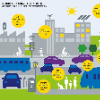An increasing number of monitoring systems have been developed in smart cities to ensure that real-time operations of a city satisfy safety and performance requirements. However, many existing city requirements are written in English with missing, inaccurate, or ambiguous information. There is a high demand for assisting city policy makers in converting human-specified requirements to machine-understandable formal specifications for monitoring systems. To tackle this limitation, we build CitySpec, the first intelligent assistant system for requirement specification in smart cities. To create CitySpec, we first collect over 1,500 real-world city requirements across different domains from over 100 cities and extract city-specific knowledge to generate a dataset of city vocabulary with 3,061 words. We also build a translation model and enhance it through requirement synthesis and develop a novel online learning framework with validation under uncertainty. The evaluation results on real-world city requirements show that CitySpec increases the sentence-level accuracy of requirement specification from 59.02% to 86.64%, and has strong adaptability to a new city and a new domain (e.g., F1 score for requirements in Seattle increases from 77.6% to 93.75% with online learning).
翻译:在智能城市发展了越来越多的监测系统,以确保城市的实时运作符合安全和绩效要求。然而,许多现有的城市要求是以英文写成,缺少、不准确或模糊的信息。对于协助城市决策者将人类特定要求转换成机器可理解的监测系统正式规格的要求,需求很高。为了应对这一限制,我们建造了城市系统,这是第一个智能城市要求规格要求的智能助理系统。为了创建城市系统,我们首先从100多个城市收集了超过1,500个来自不同领域的实体城市要求,并提取了城市特定知识,以生成有3,061字的城市词汇数据集。我们还建立了一个翻译模型,并通过需求合成和在不确定的情况下开发新的在线学习框架予以强化。现实城市要求的评价结果表明,城市要求规格的句级精确率从59.02 %提高到86.64%,并具有很强的适应新城市和新领域的能力(例如,西雅图的F1分数从77.6%提高到93.75%,通过在线学习)。



